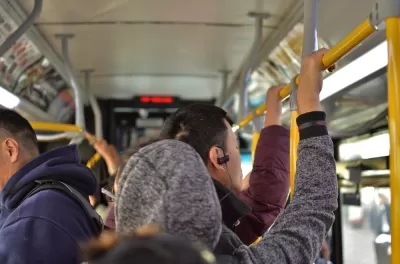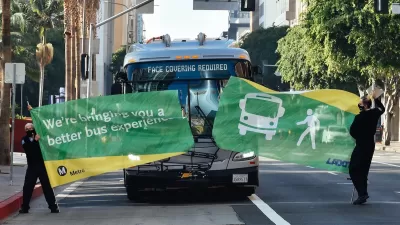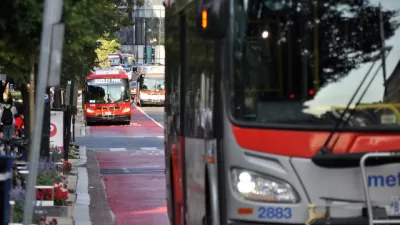A NACTO report highlights the importance of bus-friendly policies and infrastructure for boosting ridership numbers and reducing urban congestion and pollution.

To grow bus ridership, improve service. That’s the conclusion of a new (but unsurprising) report from the National Association of City Transportation Officials (NACTO), writes Dan Zukowski in Smart Cities Dive.
More specifically, the report highlights three key areas where transit agencies and city officials can take action: ensuring all-day, frequent bus service; redesigning streets for buses with dedicated bus lanes, signal priority, and improved infrastructure; and adopting broader policy reforms that support transit, such as adjusting parking fees, discouraging driving, and promoting walkability and mixed-use development.
The report provides examples of successful initiatives, such as New York City’s 14th Street busway and transit signal priority in Minneapolis. It also highlights the potential for speedy action from local agencies. “For example, faced with the need to shut down a major subway line for repairs this month, Boston quickly created dedicated bus lanes and implemented parking restrictions along several major streets to allow for temporary shuttle bus services.”
FULL STORY: Dedicated lanes, frequent service key to increasing bus ridership: NACTO

Planetizen Federal Action Tracker
A weekly monitor of how Trump’s orders and actions are impacting planners and planning in America.

Restaurant Patios Were a Pandemic Win — Why Were They so Hard to Keep?
Social distancing requirements and changes in travel patterns prompted cities to pilot new uses for street and sidewalk space. Then it got complicated.

Map: Where Senate Republicans Want to Sell Your Public Lands
For public land advocates, the Senate Republicans’ proposal to sell millions of acres of public land in the West is “the biggest fight of their careers.”

Maui's Vacation Rental Debate Turns Ugly
Verbal attacks, misinformation campaigns and fistfights plague a high-stakes debate to convert thousands of vacation rentals into long-term housing.

San Francisco Suspends Traffic Calming Amidst Record Deaths
Citing “a challenging fiscal landscape,” the city will cease the program on the heels of 42 traffic deaths, including 24 pedestrians.

California Homeless Arrests, Citations Spike After Ruling
An investigation reveals that anti-homeless actions increased up to 500% after Grants Pass v. Johnson — even in cities claiming no policy change.
Urban Design for Planners 1: Software Tools
This six-course series explores essential urban design concepts using open source software and equips planners with the tools they need to participate fully in the urban design process.
Planning for Universal Design
Learn the tools for implementing Universal Design in planning regulations.
Heyer Gruel & Associates PA
JM Goldson LLC
Custer County Colorado
City of Camden Redevelopment Agency
City of Astoria
Transportation Research & Education Center (TREC) at Portland State University
Camden Redevelopment Agency
City of Claremont
Municipality of Princeton (NJ)





























